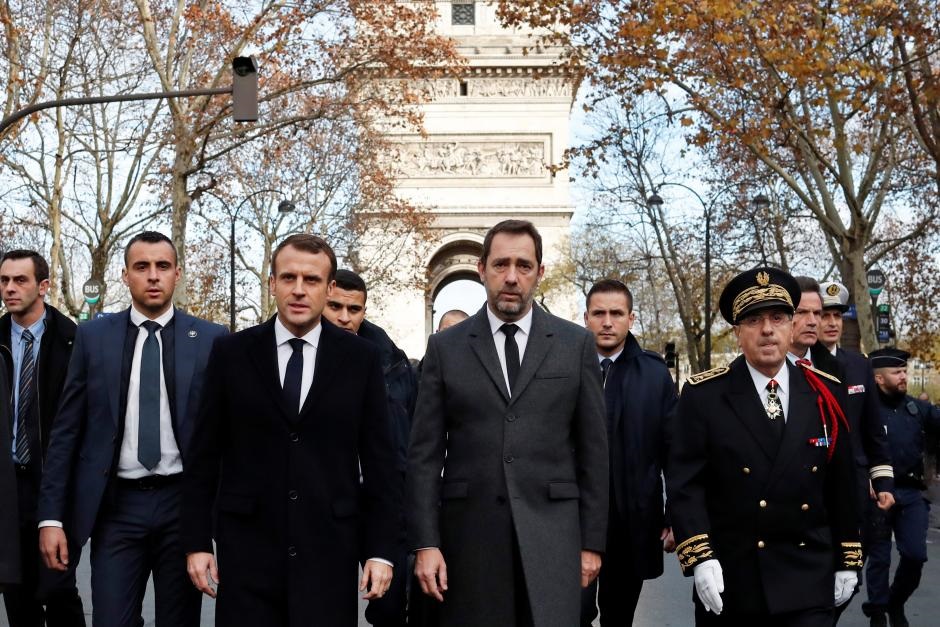PARIS -- French President Emmanuel Macron ordered his prime minister on Sunday to hold talks with political leaders and demonstrators, as he sought a way out of nationwide protests after rioters turned central Paris into a battle zone.
Riot police on Saturday were overwhelmed as protesters ran amok in Paris’s wealthiest neighborhoods, torching dozens of cars, looting boutiques and smashing up luxury private homes and cafes in the worst disturbances the capital has seen since 1968.
The unrest began as a backlash against fuel tax hikes but has spread. It poses the most formidable challenge yet to Macron’s presidency, with the escalating violence and depth of public anger against his economic reforms catching the 40-year-old leader off-guard and battling to regain control.
After a meeting with members of his government on Sunday, the French presidency said in a statement that the president had asked his interior minister to prepare security forces for future protests and his prime minister to hold talks with political party leaders and representatives of the protesters.
A French presidential source said Macron would not speak to the nation on Sunday despite calls for him to offer immediate concessions to demonstrators, and said the idea of imposing a state of emergency had not been discussed.
Arriving back from the G20 summit in Argentina, Macron had earlier rushed to the Arc de Triomphe, a revered monument and epicenter of Saturday’s clashes, where protesters had scrawled “Macron resign” and “The yellow vests will triumph”.
The “yellow vest” rebellion erupted out of nowhere on Nov. 17, with protesters blocking roads across France and impeding access to some shopping malls, fuel depots and airports. Violent groups from the far right and far left as well as youths from the suburbs infiltrated Saturday’s protests, the authorities said.
Government spokesman Benjamin Griveaux had indicated the Macron administration was considering imposing a state of emergency. The president was open to dialogue, he said, but would not reverse policy reforms.
“We won’t change course. We are certain of that,” he told Europe 1 radio.
As he spoke, workmen in the upper-crust district of central Paris set about cleaning the defaced Arc, removing charred hulks of cars and replacing the shattered windows of banks, restaurants and glitzy boutiques.
Macron unyielding
While the protests were initially against Macron’s fuel tax hikes - necessary he says to combat climate change - they have also mined a vein of deep dissatisfaction felt toward his liberal reforms, which many voters feel favor the wealthy and big business.
Police said they had arrested more than 400 people in Paris on Saturday and that 133 were injured. Some 10,000 tear gas canisters and stun grenades were fired as well as water cannon as security forces fought for control.
Macron’s plight illustrates a conundrum: How do political leaders’ introduce policies that will do long-term good for the environment without inflicting extra costs on voters that may damage their chances of re-election?
His unyielding response has exposed him to charges of being out of touch with common folk outside of France’s big cities who worry about the squeeze on household budgets and job security.
The protests have driven Macron’s popularity to record lows and left him facing a lose-lose situation, said Gael Sliman, president of the Odoxa polling institute said.
Either Macron caves in to the pressure and is derided by opponents as weak, or he puts down the dissent, Sliman said.
“In the second scenario, Macron will still come out loser, because what everyone will remember is that he wrestled with the popular classes. He would be victorious, but at the cost of having crushed them.”
Before heading into Sunday’s meeting, Macron met under heavy security with police and firefighters near the Champs Elysees boulevard. Some bystanders cheered, others jeered and called on him to resign.
So too did Jean-Luc Melenchon, head of hard-left party La France Insoumise (France Unbowed) and far-right leader Marine Le Pen, who both demanded the government unwind its fuel tax hikes. They called for parliament to be dissolved and snap elections held.
Such an outcome is unlikely, however. Macron has 3 1/2 years left of his five-year mandate and a strong majority in parliament, albeit with signs of simmering unease on the backbenches over his response to the protests.
TV footage showed the interior of the Arc ransacked, a statue of Marianne, symbol of the French republic, smashed, and graffiti scrawled on the exterior ranging from anti-capitalist slogans to social demands and calls for Macron’s resignation.
On nearby streets, some Parisians worried of a repeat of the violence next weekend. The yellow vests have already called another demonstration in Paris.
“The violence is increasing at an exponential rate,” said Claude, a resident in the affluent 16th district. “The state is losing control, it is scary. They cannot let this happen. Maybe the army should intervene.”





















































